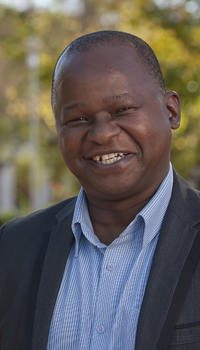Latest News Archive
Please select Category, Year, and then Month to display items
27 October 2025
|
Story Sefako Mokhosoa
|
Photo Supplied
 Ten Grade 12 learners from Mampoi Secondary School in Phuthaditjhaba.
Ten Grade 12 learners from Mampoi Secondary School in Phuthaditjhaba.
On 1 October 2025, the Projects and Innovation Directorate in the Faculty of Education at the University of the Free State (UFS) proudly hosted a certificate ceremony to honour ten Grade 12 learners from Mampoi Secondary School in Phuthaditjhaba on the Qwaqwa Campus. These learners completed a Skills Development Initiative and Workshop Series focused on digital literacy and ICT skills – a programme designed to equip rural youth with the tools they need to thrive in a digital world.
The initiative, which ran from May to August 2025, was made possible through a strategic partnership with BANKSETA to bridge the digital divide in rural communities. The learners received hands-on training in essential digital tools. Each learner also received a tablet to support continued learning and personal growth beyond the classroom.
The Director of the office in the Faculty of Education, Dr Kwazi Magwenzi, stressed that digital skills promote independence and self-directed learning. “Grade 12 is a time when learners should manage their studies, meet deadlines, and explore their options,” she said. “Digital fluency supports that autonomy. It enables learners to use online research, interactive tools, e-learning, and collaboration platforms to make learning more effective, flexible, and aligned with their pace and style. In Grade 12, where the stakes are high – with exams, tertiary entrance, and career choices – this ability helps learners become more self-directed, confident, and equipped.”
The programme not only built learners’ confidence in using ICT tools for learning and communication but also prepared them for the technologically driven environments they will encounter in institutions of higher learning.
Beyond developing digital skills, the project offered learners valuable exposure to the university environment, as their training took place on campus. Inspired by the success of this pilot, the Faculty of Education now aims to expand the initiative to reach more schools and learners across the region. The vision is to scale up access to digital education and empower more young people in rural areas with the skills necessary for academic and professional success.
This ceremony marked the conclusion of a successful training programme and the beginning of a long-term commitment to digital empowerment and lifelong learning in rural communities.
South African citizens are yearning for a good story to tell
2014-03-13
|

Dr Sethulego Matebesi
Photo: Sonia Small |
The 20 Year Review is in essence a continuation of President Jacob Zuma’s State of the Nation Address and the ‘we have a good story to tell’ narrative. The report provides a glowing picture of successes achieved over the two decades. The successes highlighted include the basic human rights enjoyed by South Africans, a marked improvement in economic growth, and the provision of social services such as health care, education and housing. And as expected, the Review is dedicated to Nelson Mandela.
The major accomplishments were made through the strategic policies of the ruling African National Congress (ANC). For example, emphasis has been on improving the lives of South Africans through pro-poor economic interventions, in building social cohesion, investing in economic infrastructure, fighting HIV and AIDS and tuberculosis, which resulted in improved health outcomes.
Generally, the assertions about ‘accomplishments’ have been made against solid evidence and are thus not debatable. What overshadows the 20 Year Review, is the story that is not being told. This is the story of a political economy marred by rampant corruption, high levels of unemployment, declining accountability, and unresponsiveness. This untold story has become the hallmark of President Zuma’s tenure. Meanwhile, the average South African citizen is still yearning for ‘a good story to tell.’
For more political comment or to speak to Dr Matebesi, please call René-Jean van der Berg at +27(0)83 645 5940.